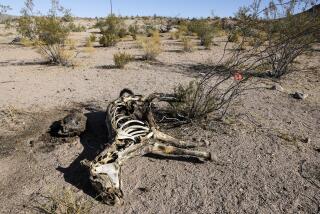18 rhino carcasses found in South Africa
- Share via
Reporting from Johannesburg, South Africa — Wildlife groups react with shock to news of the discovery at the Letaba Ranch Game Reserve. South Africa has seen a major increase in rhino killings this year, with poachers armed with AK-47s frequently attacking the endangered animals.
South African wildlife officials found the decomposing bodies of 18 rhinos — all dehorned victims of poaching — in a remote area of a large private game reserve close to the border of Kruger National Park, authorities said Friday.
Wildlife organizations reacted with shock to news of the find at the 100,000-acre Letaba Ranch Game Reserve. The border between Letaba and Kruger is unfenced, allowing animals — and poachers — to wander freely across the landscape.
South Africa has seen a major increase in rhino killings this year, with criminal gangs armed with AK-47 rifles attacking the animals. Since last week, 25 dead rhinos have been discovered — almost 10% of the year’s total.
More than 270 rhinos had been killed this year even before the 18 carcasses were found at Letaba, officials say. That compares with 122 last year and 83 in 2008.
Dealing in rhino horn is banned under the Convention on International Trade in Endangered Species, or CITES. But the horns are in high demand in Asian markets such as China and Vietnam, where they are valued for their perceived medicinal benefits.
According to the Endangered Wildlife Trust, a South African nonprofit organization, the horns are used to treat non-fatal ailments such as rheumatism and fever. In Vietnam, they are believed to cure cancer. The trust says there’s no scientific evidence that rhino horn has any medicinal value, and it says other ethical and sustainable medical products are available.
Wildlife groups, including Traffic and the Endangered Wildlife Trust, warn that rhinos — particularly the highly endangered black rhino — face extinction unless poaching is curbed. A CITES report released last year found that there were 18,553 white and 1,570 black rhinos left in South Africa.
The discovery of the rhino graveyard in a remote northern corner of the country underscores the difficulty in tracking such killings, and many ranchers believe the number of poached animals may be much higher than official numbers show.
Officials think only half the 18 rhinos found in Letaba were killed this year. Some of the carcasses had been lying in the bush for some time, and officials are trying to determine how long they had been there.
About half of South Africa’s rhinos are on private game reserves, which face the cost and complication of trying to protect animals against criminal networks. The ranchers who run the reserves as tourist attractions often employ armed guards, who live with the rhinos in the bush.
But gangs — sometimes a dozen men with automatic weapons — often have little difficulty overpowering the guards. Some use helicopters to shoot the rhinos from the air, but most use trackers on foot. They sometimes rely on leaked information about the rhinos’ whereabouts.
A group of veterinarians was arrested for involvement in rhino poaching in recent months. Vietnamese diplomats in South Africa have also been implicated.
South Africa’s state-owned wildlife parks are also struggling to contain poaching. Defense Minister Lindiwe Sisulu said this week that the army would be deployed to protect rhinos after South African National Parks, or Sanparks, made an urgent request for help.
“Rhino poaching is a crime that we have to stop immediately. It is cruel and brutal,” Sisulu said.
She said the military had advanced equipment to take on the poaching syndicates.
More to Read
Sign up for Essential California
The most important California stories and recommendations in your inbox every morning.
You may occasionally receive promotional content from the Los Angeles Times.









